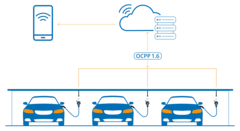What is EV Charging with OCPP?
Last updated:
More and more charging stations boast being OCPP-compliant.
But what do these 4 letters mean and what’s great in it for you?
You'll know everything soon enough.
Do you want to allow Integration of youtube videos?
Allows the playback of videos, that are hosted on youtube.com. By allowing this feature, you accept the privacy agreement of google.
What is OCPP?
OCPP stands for Open Charge Point Protocol. Basically, it is an open specification for EV charging stations enabling them to communicate with a centralised management system.
It’s similar to a smart home where your light switches, air-conditioners and even garage doors are exchanging messages with your phone so that everything can be controlled from one place.
How does OCPP work?
Let’s imagine you have several EV charging stations from different manufacturers and some of them (or even all of them) do not support OCPP.
In this case, you can’t control your charger points simultaneously as they “speak” different languages. You are also tied up to one hardware manufacturer and software provider. Taking advantage of tempting offers from other manufacturers is not possible.
And now, welcome to the OCPP world where all your charging points are working within one open standard. This open-source “language” gives you full freedom. It enables the charger, backend and management system to communicate irrespective of vendor and manufacturer.
As a result, you have control over pricing, start/end of charging and other things that matter when it comes to charging an EV.
All in one dashboard!
Note: Although all data will be sent back and forth constantly within the same network, it is well protected by encryption. The OCPP developers improve the level of security with each new version. Therefore, no one but you will be able to access the OCPP EV charging information.
Can any OCPP hardware work with any OCPP software?
Or in other words, can all devices and networks with the “OCPP tag” communicate with each other? The short answer is yes.
However, there is one thing though to consider and that’s when the OCPP version comes into play.
The fact is, you can set a connection between any OCPP hardware and software as long as the charging station management system and EV charging hardware both support the same OCPP version.
For instance, our go-e Chargers are compliant with OCPP 1.6 (most common). Therefore, they operate perfectly within a network where all other chargers support this version.
OCPP is not something you can add to your charging station. Therefore, it’s vital to check whether the charger is OCPP-compliant before buying it.
Different OCPP Versions: Brief Overview
OCPP has been out there for a while. The very first version - OCPP 1.5 - released in 2012 got significantly improved as the standardization body - Open Charge Alliance (OCA) - realised users’ needs.
All in all, now you can find 4 main versions of the OCP Protocol the latest of which is OCPP 2.0.1. Here, you can see the distinctions between all the protocols that have ever been released by Open Charger Alliance.
Wallboxes with OCPP 1.6 JSON
Despite the fact that technological progress never stops and newer OCPP versions saw the light of day some years ago already, the Open Charge Point Protocol 1.6 remains the most common one.
That’s why go-e implemented it in its charging stations.
OCPP 1.6 JSON offers three special features:
- Load balancing
- Central smart charging
- Local smart charging
Well, besides all this, the 1.6 version makes charging easier and clearer for both EV drivers and charging stations owners. In short, by setting up a network of chargers with OCPP 1.6, you can't go wrong.
Does a Wallbox with OCPP Make a Difference to you?
Wondering whether OCPP is something you actually need? Here are the groups of people who can benefit from using an OCPP-compliant charging station.
Charging stations with OCPP for private users
If you plan to get one or two EV charging stations, OCPP is not a major requirement when choosing them. Even if you plan to share your wallbox with, say, your neighbours, you don't have to think about the technical side of charging control.
There are a few exceptions though:
- OCPP is required by local regulations
In some cases, you’re obliged to connect your EV charging station to an OCPP service operated by the local power company. For instance, in 2019 the UK made smart charging standards (OCPP or other communication protocols) mandatory for new charger stations.
- OCPP support is a requirement for some subsidies
For instance, in Austria in early 2022 it was possible to claim a grant of 900 euros if you install an intelligent OCPP-capable wallbox in a multi-apartment building.
Charging stations with OCPP for business owners
Quite a different situation arises when you own a fleet of charging stations and have multiple people who want to use them.
That’s the case when OCPP becomes crucial. This open-source protocol will allow you as a Charge Point Operator (CPO) to:
- monitor your fleet of chargers
- control charging processes (e.g. activate load balancing)
- manage customer identification
- handle billing.
On top of that you can use charging stations from different manufacturers and software providers and control them all within one system.
Isn’t it awesome?
The only requirement is that they all should support the same OCPP version. It’s as simple as that.
OCPP Benefits
Most things in life come with both fors and againsts. OCPP breaks this “rule of thumb” and brings you a win from every angle.
Let’s start with the main advantage - OCPP enables charging stations to communicate with management systems from various vendors. If you know how many suppliers there are with how many different payment plans, you will surely appreciate this opportunity.
But that’s not all.
We suggest you consider other excellent benefits as well! Here they are:
- Flexibility
Just imagine: your software provider suddenly folds and is no longer there to offer you the services you need. What do you do then? The answer is simple if your charging stations are OCPP-compliant - you change the provider and find a new one within a couple of days.
- More independence
The market offers plenty of hardware and software options. The more freedom you have, the more likely you are to find the one that suits you best.
- Financial security
Sometimes, network operators raise their prices out of the blue. But that’s not a conspiracy theory, so they don’t do it all together. With OCPP, if one network operator increases prices, you can switch to another one in no time.
Summary
To conclude, OCPP establishes a common language that ensures that the charger, backend and management system are able to exchange data and work together. It is important that all the parties support the same OCPP version.
Open Charge Point Protocol makes it easy to set up a fleet of charging stations and control them all simultaneously.
Moreover, changing a network provider is not a problem. Private electric vehicle drivers can also benefit from OCPP as in some cases it is a vital requirement for receiving subsidies for charging stations.


